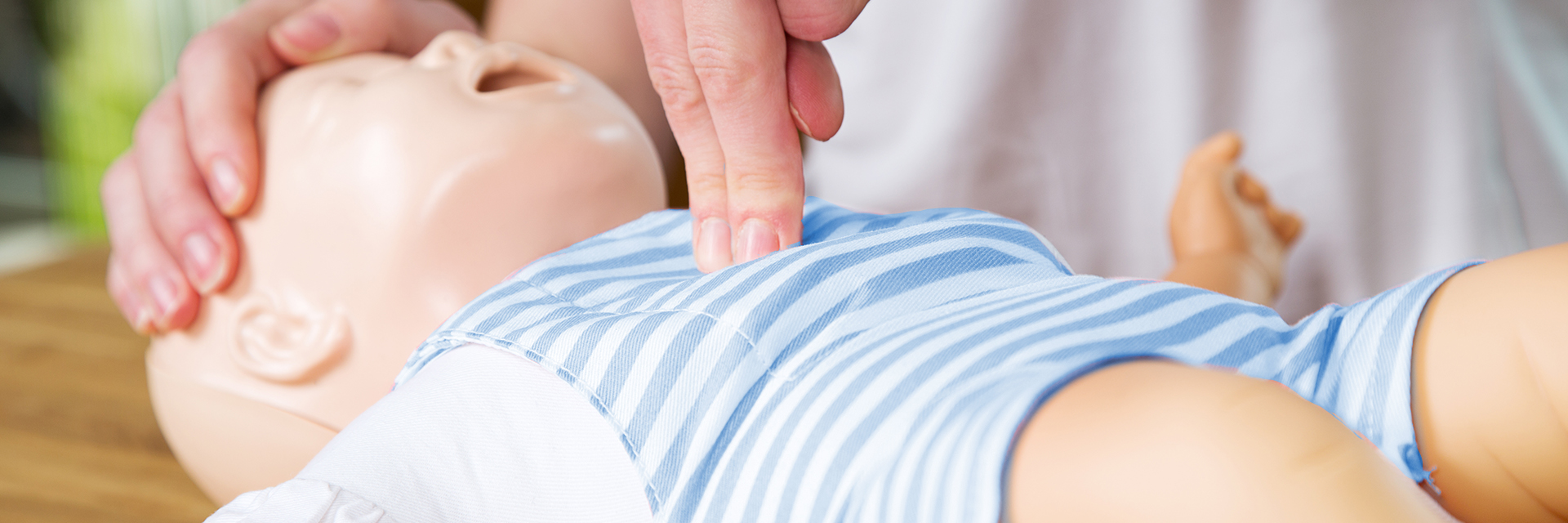If you believe your baby is choking (on food, a small object or something else), follow these instructions from the American College of Emergency Physicians:
- First, determine whether your baby can breathe, cry or cough.
- If your baby is coughing strongly, this usually means the airway is blocked only slightly or not blocked at all. Coughing may dislodge the object successfully.
- Only begin first aid for choking if your baby cannot breathe at all or can only produce a weak cough and seems to be losing color in the face.
If an infant (under age 1) is conscious and choking:
- Call 9-1-1 or have someone else call in case emergency medical help will be needed.
- Sit down and lay your forearm, with palm facing up, along your thigh. Then place your baby face down over your forearm with the infant’s head positioned a bit lower than his or her body. Use your hand to lightly hold the baby’s chin (to help support the head).
- Using the heel of your other hand, deliver up to 5 back blows, forcefully, between your baby’s shoulder blades.
- Turn your baby face up, supporting the head with one hand. The head should still be positioned lower than the body.
- With 2 or 3 fingers, deliver up to 5 thrusts into your baby’s sternum (breastbone) area. Press the sternum down 1/2 to 1 inch with each thrust. Avoid the tip of the sternum.
- Repeat both back blows and chest thrusts until the object is expelled or the baby becomes unconscious.
If your choking baby becomes unconscious, call 9-1-1 and perform CPR if you know how. Losing consciousness requires immediate, emergency assistance. Knowledge of CPR (cardio-pulmonary resuscitation) and other first aid is important and valuable for all parents and caregivers.
Don’t wait for an emergency to happen. Find a CPR / first aid class in your community and take it.
Choking Prevention Tips
Accidental choking kills nearly 4,000 adults and children in the U.S. each year; 2/3rds of the children who die from choking are under age 4. These tips will help you prevent your baby or child from choking:
- Supervise mealtimes. Do not offer—or allow siblings to offer—unsafe foods to a baby or toddler. These include hot dogs, nuts, chunks of meat, grapes, hard candy, popcorn, chunks of peanut butter and uncooked vegetables.
- Keep toys with small parts and other small household items (buttons, round disc batteries, coins, etc.) out of your baby’s or toddler’s reach.
- Do not give your baby or toddler a balloon without strict supervision; pieces of balloons that pop (especially near or in a young child’s mouth) can quickly become a dangerous choking hazard.
See also ...
• Helping a choking baby (includes illustrations)
• Quick reference infant CPR guide
This message is not intended to provide individual medical advice. Always seek the advice of a physician or qualified healthcare provider for any questions you have about your health or medical condition, your breastfeeding issues and your infant's health. Never disregard, avoid or delay contacting a doctor or other qualified professional because of something you have read in our emails, webpages or other electronic communications.
Powered by UbiCare

